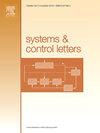Output feedback stabilization of an ODE-heat cascade system by neural operator approximations
IF 2.5
3区 计算机科学
Q3 AUTOMATION & CONTROL SYSTEMS
引用次数: 0
Abstract
In this paper, we consider the output feedback stabilization of an ordinary differential equation (ODE)-heat cascade system with a variable coefficient reaction term. We design the boundary feedback controller by backstepping method, where the control design is accelerated by neural operators. For backstepping kernel functions involving spatial variables, it is difficult to obtain the analytical solutions and time-consuming to compute the numerical solutions. In order to solve this problem, we use neural operator learning framework to accelerate the generation of approximate kernel functions, and then obtain the feedback controller. Specifically, we give the continuity and boundedness of the kernel partial differential equations (PDEs) and establish the nonlinear mapping of the reaction coefficient to the kernel functions. Through DeepONet approximation of nonlinear operator, we prove the existence of kernel PDEs under DeepONet arbitrary accuracy approximation. Then we design the DeepONet-approximated observer and output feedback controller, and demonstrate the output feedback stability of the closed-loop system under DeepONet approximations. Numerical simulations verify the effectiveness of the controller and illustrate that this method is two orders of magnitude faster than PDE solvers.
基于神经算子逼近的ode -热级联系统输出反馈镇定
本文研究了一类具有变系数反应项的常微分方程-热级联系统的输出反馈镇定问题。采用反步法设计边界反馈控制器,利用神经算子加速控制设计。对于涉及空间变量的反步核函数,其解析解难以求出,数值解计算耗时。为了解决这一问题,我们利用神经算子学习框架加速近似核函数的生成,进而得到反馈控制器。具体地说,我们给出了核偏微分方程的连续性和有界性,并建立了反应系数到核函数的非线性映射。通过对非线性算子的DeepONet逼近,证明了在DeepONet任意精度逼近下核偏微分方程的存在性。然后设计了DeepONet逼近观测器和输出反馈控制器,验证了在DeepONet逼近下闭环系统的输出反馈稳定性。数值仿真验证了该控制器的有效性,并表明该方法比PDE求解方法快两个数量级。
本文章由计算机程序翻译,如有差异,请以英文原文为准。
求助全文
约1分钟内获得全文
求助全文
来源期刊

Systems & Control Letters
工程技术-运筹学与管理科学
CiteScore
4.60
自引率
3.80%
发文量
144
审稿时长
6 months
期刊介绍:
Founded in 1981 by two of the pre-eminent control theorists, Roger Brockett and Jan Willems, Systems & Control Letters is one of the leading journals in the field of control theory. The aim of the journal is to allow dissemination of relatively concise but highly original contributions whose high initial quality enables a relatively rapid review process. All aspects of the fields of systems and control are covered, especially mathematically-oriented and theoretical papers that have a clear relevance to engineering, physical and biological sciences, and even economics. Application-oriented papers with sophisticated and rigorous mathematical elements are also welcome.
 求助内容:
求助内容: 应助结果提醒方式:
应助结果提醒方式:


